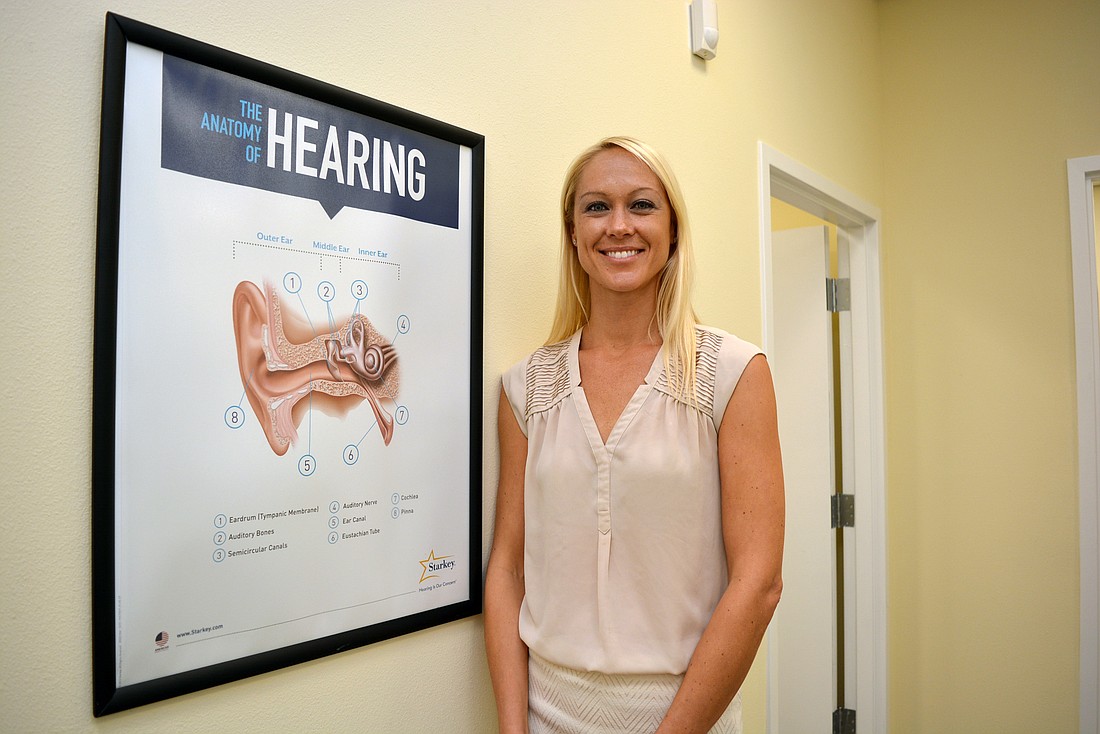- July 4, 2025
-
-
Loading

Loading

Before Ed Ogiba went deaf, his hearing became garbled.
He would be at an outing, such as a party or business meeting, with plenty of chatter and background noise. He might have nodded as if he’d heard the conversation, but his facial expressions gave him away.
“Often, I had people say, ‘Ed, did you hear me?’” said Ogiba, a spokesman for the Hearing Loss Association of Sarasota. “I found myself saying, ‘I heard you, but I didn’t understand you.’ I didn’t know what that meant until I joined the Hearing Loss Association. … Most people think the solution is turning up the volume. That’s not what you need. You hear most of the words. All it takes is not understanding one word to throw off understanding.”
Ogiba said that like lead in a sharpened pencil, hearing dulls with time.
What is it?
According to the Center for Hearing and Communication, a nonprofit that provides health care for people with hearing loss and auditory challenges, one in three people over the age of 65 have hearing loss, and two in three people over the age of 75 have hearing loss.
When you hear something, that sound travels into the ear, begins to vibrate the eardrum and then travels into the cochlea (the inner ear), where tiny hair cells amplify the sound and send that information to the brain.
“It’s in the brain [where] we actually hear,” said audiologist Dr. Lyndsey Nalu, of Adept Audiology in Sarasota. “It’s the
brain that processes that information. Your brain atrophies, and that affects how clearly you process speech over time.”
Nalu said hearing loss is inevitable as you age because those hair cells begin to deteriorate; that means some sounds no longer get to the brain, which is then no longer being stimulated.
That’s why taking care of hearing loss early is so important, Nalu said. As hearing loss increases, the brain must work harder to interpret the sounds it receives and will begin creating neurological pathways to parts of the brain that are normally used for other functions, such as memory.
The longer that atrophy occurs, the less likely it can be corrected.
“Once it’s gone, it’s typically gone,” Nalu said.
Hearing aids — not sound amplifiers — help the brain reroute those neurological connections, so the sound goes to the proper part of the brain again, Nalu said.
Many people with hearing loss experience symptoms of fatigue and memory loss because other parts of the brain are strained. They also tend to become more isolated because understanding conversations is difficult.
“It affects us emotionally,” Ogiba said. “Helen Keller said it best: ‘With blindness, you lose things.’ That’s not as bad as hearing loss because, ‘With hearing loss, you lose people.’ Most people with hearing loss become isolated pretty quickly.”
What can I do about it?
Ogiba has learned to read lips and has taken advantage of other techniques to help improve his hearing and conversations. He said those soft skills have improved his hearing by 40%. Beyond that, he uses 11 devices to assist with his hearing, including a program that transcribes phone conversations.
He said navigating which hearing device or tools to use can be overwhelming, but audiologists and organizations including Hearing Loss Association are there to help.
Nalu said most people do not use as many tools as Ogiba, but there are plenty of them available to help those struggling to hear.
The first step, however, is getting your hearing checked by an audiologist each year as if it were a vision test or your annual dentist visit, Nalu said. Such exams should start around age 60, or earlier if you suspect hearing loss. She said Medicare even covers the cost of that exam.
“You’ve got to think of hearing loss as preventative,” Nalu said. “You’re stimulating your brain. You’re able to preserve brain function by keeping your brain active. And you’re able to improve communication, which will ultimately improve your quality of life.”
The base test checks your reaction to low- and high-pitched sounds and checks how well you understand words. Typically, the high-frequency loss — sounds with “S,” “T” or “P” — comes first and makes sounds more garbled, Nalu said.
If your hearing loss becomes significant enough, a hearing aid might be helpful. Nalu said hearing aids have advanced, and there are hundreds of styles available. Many even connect to Bluetooth, which allows users to easily hear on their cellphones.
Nalu said that although many people worry about looking “old” or the hearing aids being noticeable, most of the devices are now discreet. She said vanity should not keep you from engaging more with friends and loved ones.
“What’s more noticeable, your hearing aid or your hearing loss?” Nalu said.
The cost of hearing aids typically ranges from $2,000 to $6,000, but that does include service on the equipment for the life of the hearing aid.
A cochlear implant, which is a replacement of the entire cochlea, works best when hearing aids become ineffective.
Ogiba and Nalu said individuals can help preserve the hearing they have and help keep it longer simply by being aware of volume. If it’s at 85 decibels or more, you are at risk for damage to your ears.
Nalu recommends wearing earplugs in loud situations and avoiding exposure to loud noise when possible. If you or a loved one uses headphones, ensure the volume is low enough to hear outside conversations, and limit louder noises to 30 minutes.
And if you think you might be losing your hearing, don’t put off a visit to the audiologist. Nalu said the average person waits seven to 10 years to get hearing loss checked, and by then, much of the loss is irreversible.
“Stop waiting,” Nalu said. “We know delayed treatment affects brain function and cognitive abilities.”